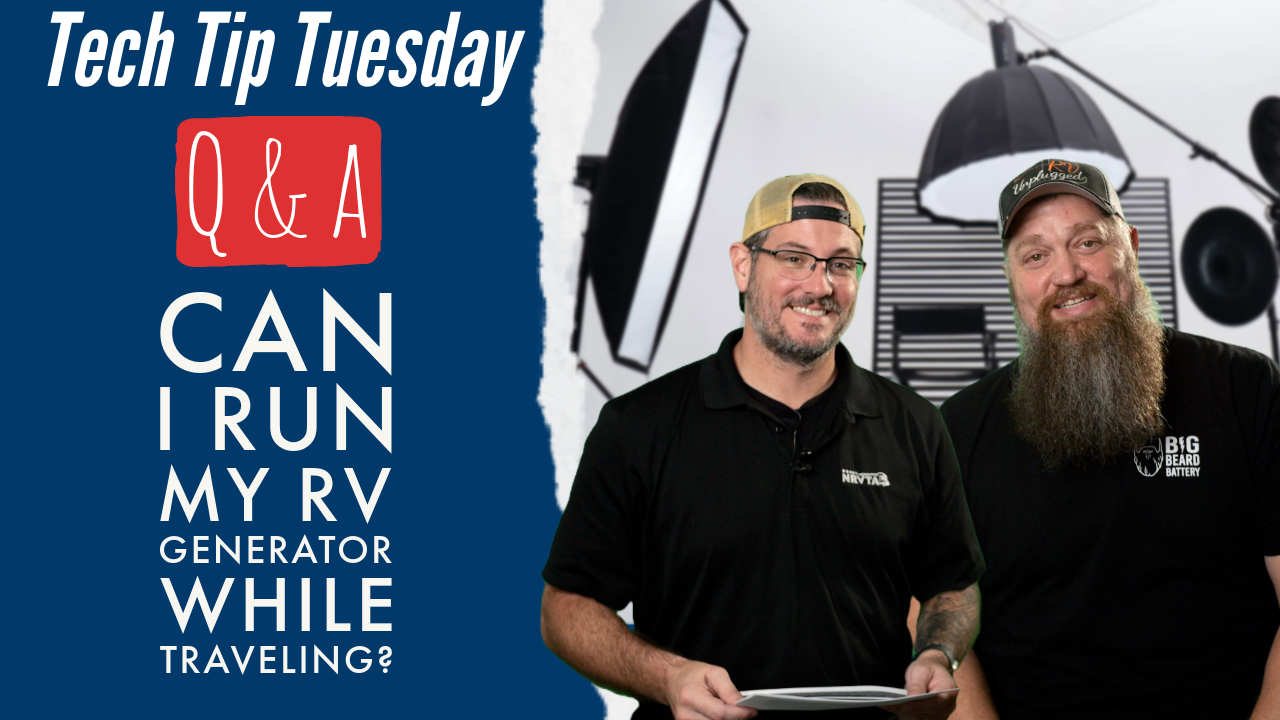Get your RV Technician Certification in as little as 5 weeks!

Welcome back to Todd’s Two-Minute Tech Tip Tuesday, brought to you by the National RV Training Academy—the largest hands-on RV training academy in America!
This week, I’m here with Tony, and we’re tackling some of your most pressing RV questions. Tony’s going to help by reading out your queries, and I’ll be answering them right on the spot. Let’s jump right into it!
Question 1: Running Your Propane Generator While Driving
RVing the Crossroads of Life asks:
“Todd, I know what your instructions are on traveling with the propane on. My question is on hot days: is it okay to turn an Onan 5500 propane generator on in one AC? Your opinion is appreciated.”
Great question! When it’s hot outside and you need to run your air conditioner, absolutely go ahead and use your generator. It’s essentially an internal combustion engine, similar to your truck, and is designed to be safe while running. The main concern when it comes to propane is actually with your refrigerator or water heater—if these are running on propane while you’re driving, the flame can be blown out by the wind, potentially causing damage or a fire hazard. But for your generator and AC, you’re good to go!
Question 2: Storing Lithium Batteries for Winter
Chad Haney asks:
“We just bought a 2024 Momentum 320G toy hauler with 660 watts of solar pre-installed and want to convert to the 300Ah 12V Big Beard lithium battery. I’m planning on doing a lot of boondocking this winter in Arizona. We live in Minnesota. How do I store the battery for the winter? Should I use a trickle charger or just unhook it?”
With Big Beard lithium batteries, you have a few options. These batteries are self-heating, so you can leave them on, and they’ll take care of themselves in colder temperatures. If you decide to store them, simply turn them off by pressing the button and ensure the light goes out. For lead-acid, gel, or AGM batteries, using a trickle charger is a good idea to keep them maintained. Extreme cold affects all batteries, so if you plan to store them where it gets very cold, make sure to keep them as warm as possible.
Question 3: Running AC Off Batteries Without Shore Power
Gary Merrill asks:
“I’ve got a 2024 Dinet 3400 KD, and the dealer said I could run AC on the two 300Ah batteries, but when I tried, the Firefly shed the load. How many amp hours do I need to run the AC at night without shore power or a generator?”
This is a great question about power supply and demand. Here’s the breakdown: most RV air conditioners use around 1,400 watts per hour, especially at night when it’s cooler. A single 300Ah lithium battery can provide approximately 3,600 watts of power (300Ah x 12V). To keep your batteries healthy, we recommend using only about 90% of the battery’s capacity, which gives you around 3,000 usable watts per battery. With two batteries, you have about 6,000 watts available, which translates to roughly four hours of continuous AC use. Adding a third battery would extend this to about six hours. The “load shedding” you’re experiencing might be due to the inverter’s capacity or the Firefly system managing loads automatically to prevent overuse.
Question 4: Solving Low Water Pressure in One Faucet
Mechanic Mark asks:
“I have a 2024 Dinet 3400 KD, and everything works great except the lavatory faucet, which only gives a trickle of water. What could be causing this?”
If you’re experiencing good water pressure in all faucets except one, the issue is likely localized. Start by checking the aerator on the affected faucet; these can get clogged with debris or mineral build-up. If that doesn’t solve the problem, look for a kinked line under the sink or along the plumbing leading to the faucet. It’s less likely, but there could also be an obstruction somewhere in the line itself.
Question 5: Running an Inverter While Plugged Into Shore Power or Generator
RVing with Bandit asks:
“I have my inverter turned on and decided to start the generator or plug into shore power. Is it dangerous or bad for my equipment if I forget to turn the inverter off before powering up using these other 120V AC sources?”
If your RV is wired correctly and has a transfer switch (common in most factory installations), then there’s no problem running the inverter while also using shore power or a generator. The inverter should have a pass-through function that automatically lets the incoming 120V power pass through when available, switching back to battery power when it’s not. Just be sure your system is set up properly to avoid any issues.
Wrapping Up
That’s it for this week’s Tech Tip Tuesday! We covered a lot of ground today, from using generators while driving to managing power for boondocking. Remember, if you have any questions, leave them in the comments below, and we’ll get to them as soon as we can.
Stay tuned for next week’s tips, and don’t forget to subscribe so you never miss an update. Thanks for watching, and happy RVing!
Get Registered Today!
Talk to a student advisor to learn more!